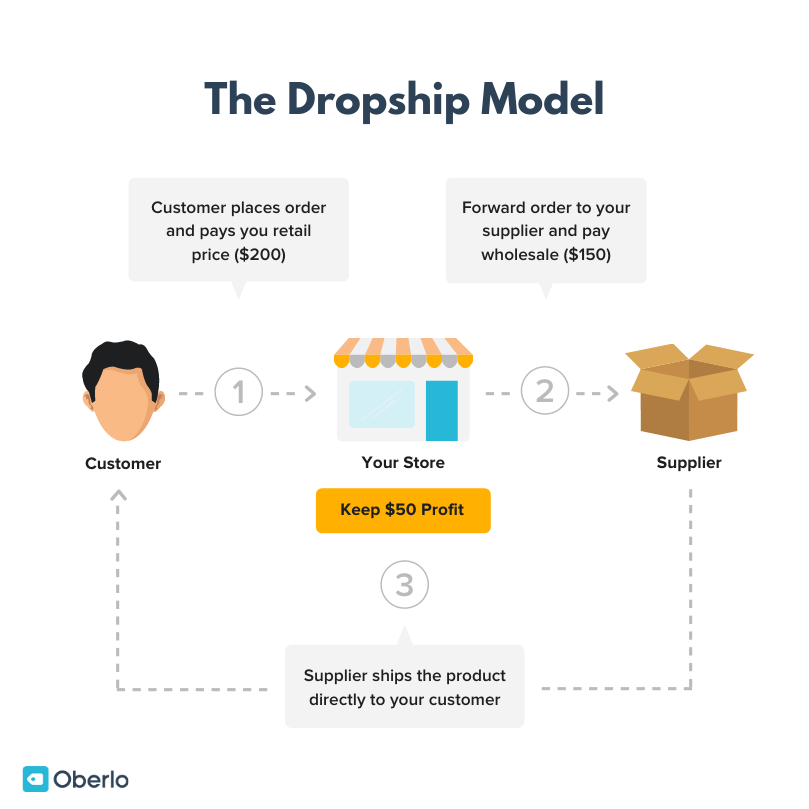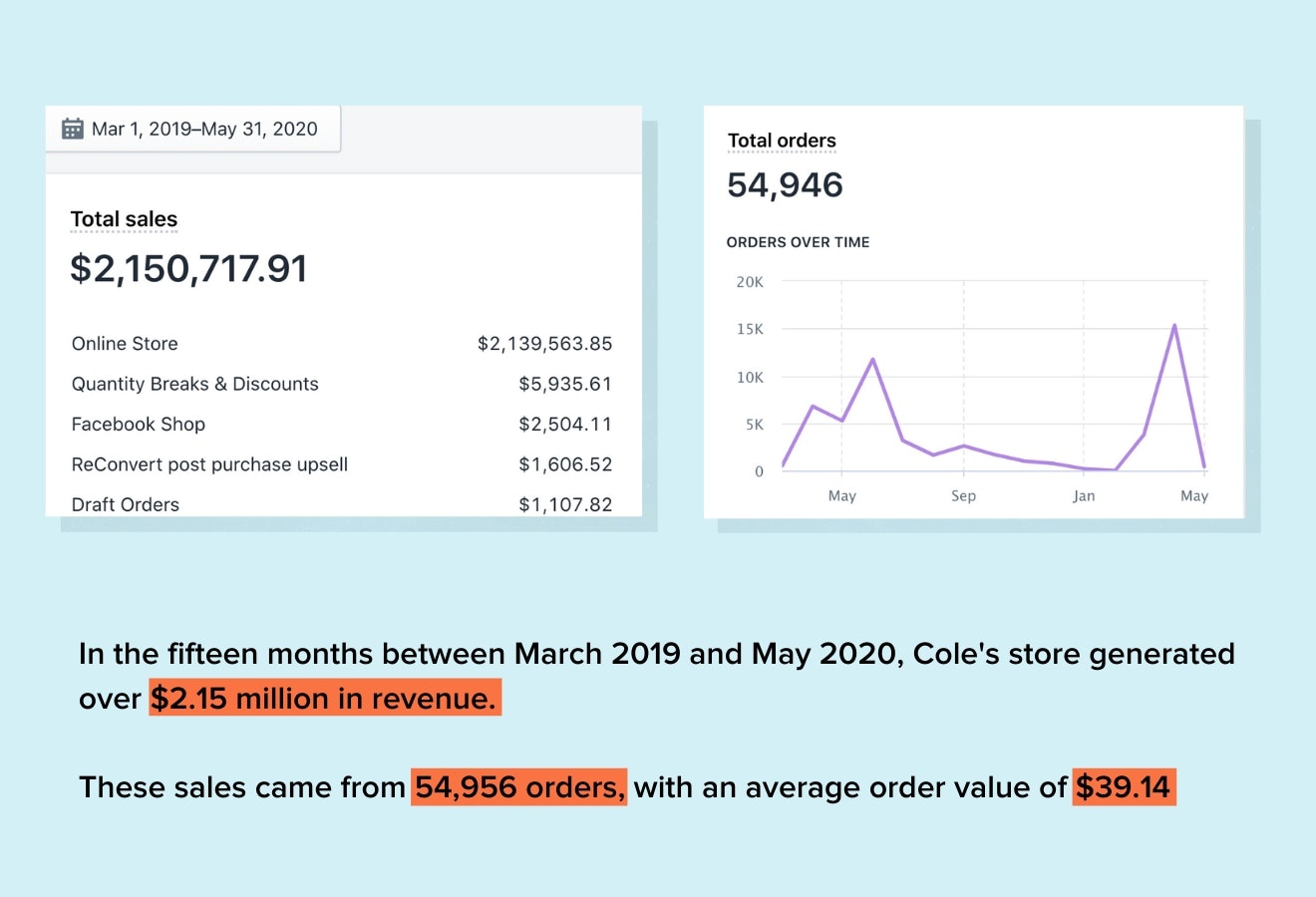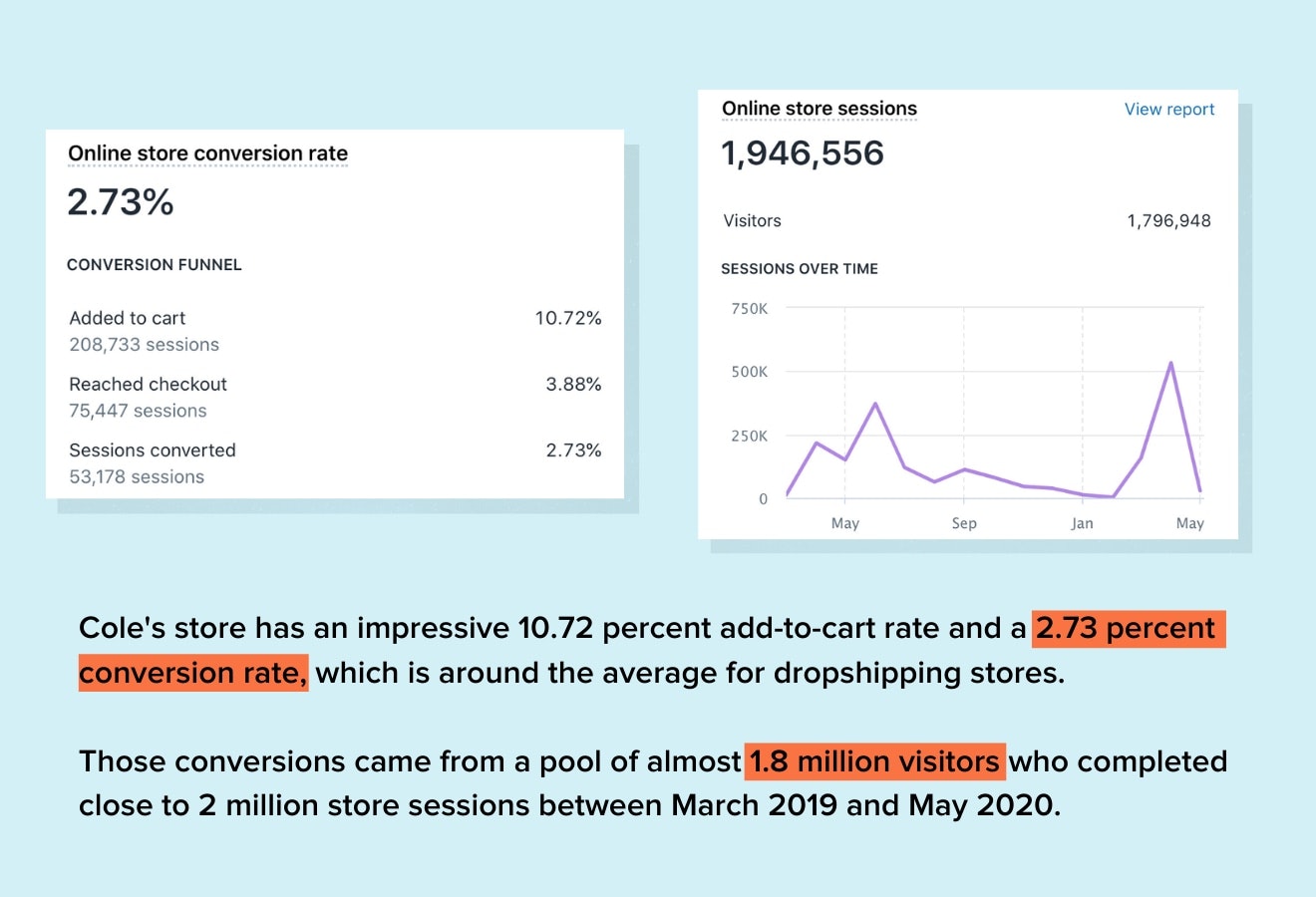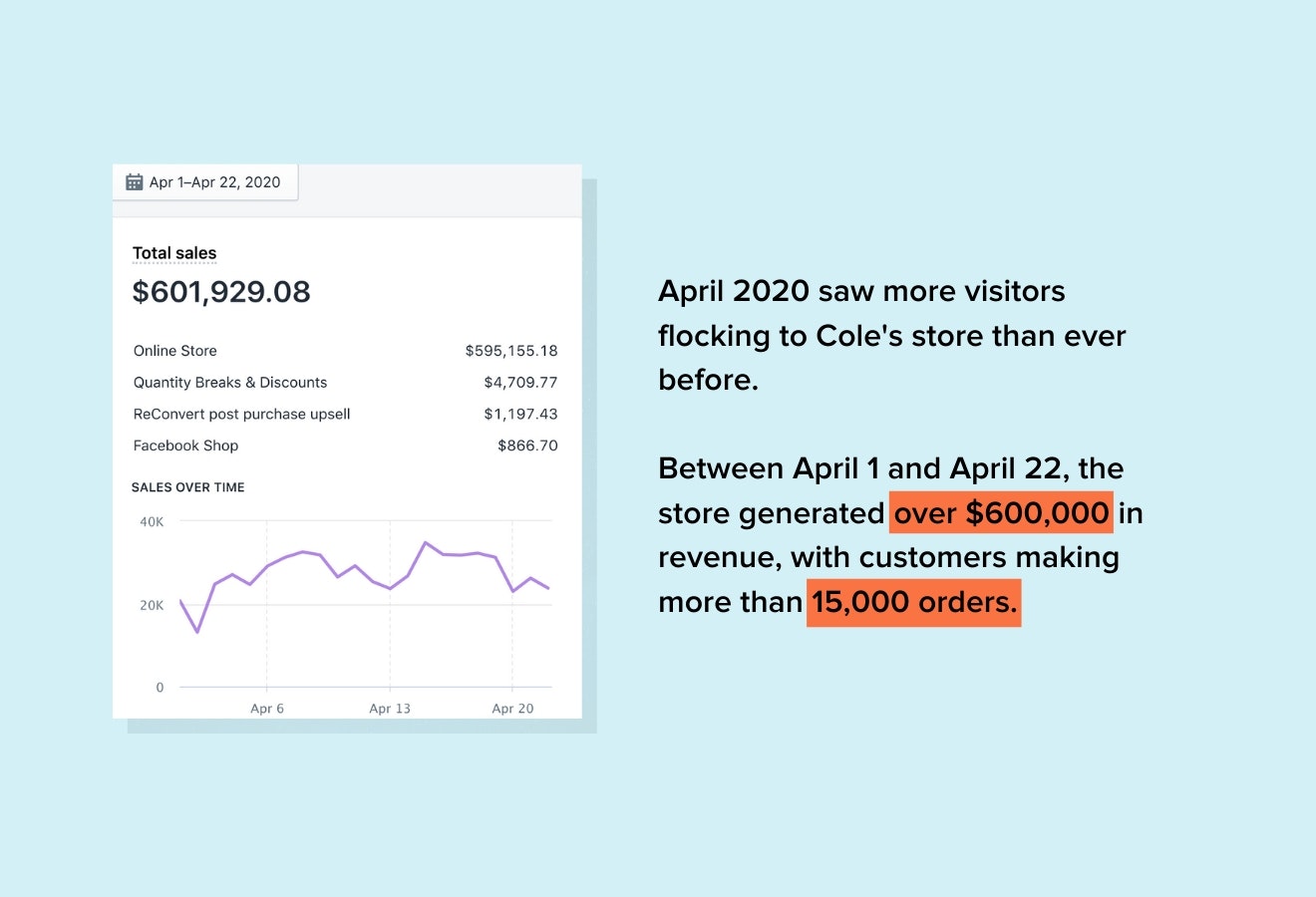MEET THE COLLEGE STUDENT TRYING TO GRADUATE WHILE BUILDING A MILLION DOLLAR EMPIRE

Getting a hold of someone as busy as Cole Turner is no easy task.
Hoping to graduate with his engineering degree soon, Cole’s days are occupied by his final semesters of study.
But studying isn’t the only thing taking up this 22-year-old’s time; he’s also managing an ecommerce store that’s made over two million dollars in sales since March 2019.
After hearing about ecommerce and dropshipping when he was 18, Cole quickly became obsessed with learning how to sell online. But his multi-million dollar store was no overnight success. It came after some big failures, and slowly building up his skill set.
With Cole about to embark on the next step of his ecommerce journey, he took some time out to speak with Oberlo about his progress so far. It was clear that he had learned a ton since he began dropshipping as soon as we began talking. So, whether you’re contemplating starting a store or curious about scaling one, read on to hear Cole’s experience and advice.
Introductions to Ecommerce and Dropshipping
While Cole Turner of 2020 might be a 22-year-old entrepreneur turning his store into a multi-million dollar brand, just four years ago, it was a very different story. Back then, Cole was an 18-year-old college student who had no idea that a conversation with a friend would change his life trajectory.
While he was home for the Christmas break, Cole sent his friend George a message to catch up. While Cole describes his 18-year-old self as a “regular college student,” he says his friend had always had an entrepreneurial-mindset.
“I said, ‘Hey, what are you up to buddy, what are you working on these days?’ And he said, ‘Oh well, I’m actually projected to hit a million dollars this year.’ And when I was 18 I was like, ‘That’s impossible.’ I was like, ‘No way anybody I know can make a million dollars.’”
Floored by those staggering numbers, Cole wanted to know everything about George’s business ventures. He immediately started watching YouTube videos that he recommended and began learning all about dropshipping and ecommerce.
Learning the Ropes and Becoming a Mentor

Eager to start earning his own money, he opened a store selling plants and pottery, which quickly failed. However, Cole continued to learn as much as he could, undeterred by his failure.
But success wasn’t easy, and the college student made some significant monetary sacrifices.
“I kept learning, I kept researching. I YouTubed, I Googled, I did everything. And I ended up losing $5000 on Facebook ads.”
Cole was pouring all the money he had into his fledgling store but still couldn’t make any decent returns. With all of the information he’d consumed, he even managed to get a job mentoring others with their stores. It was the epitome of faking it till he made it.
While the mentoring gig brought in some good cash, every cent he made went straight back into the business. Despite not making any meaningful profit, Cole knew he was on the brink of success; he just had to stick with it. Unfortunately, not everyone in his life shared his mindset. And before he found success, he started lying about what he was doing.
“I kept pushing and kept trying. Eventually, I was at the point where I was lying to my entire family. I told them I had stopped trying to dropship because I had lost all my money.”
Cole knew that his deception wouldn’t last forever, and sure enough, he soon found his first winning product.
The First Taste of Success
Using a general store to test a variety of products, Cole eventually found a piece of jewelry that caught shoppers’ attention. He quickly scaled up ads and focussed on making that item work. He redesigned his general store, turning it into a one product store.
His dedication was rewarded when that one single item made him $75,000 in sales.
Having this first major success, Cole knew he could make dropshipping and ecommerce work. He wanted to see what else he could do, so he sold the jewelry store to an entrepreneur on Facebook for $20,000. Then he opened a niche store with a partner.
Between Cole and his partner, they were able to discover multiple winning products, and thanks to the fine-tuning of his marketing skills, he could more effectively market the items.
After scaling the store, Cole and his partner managed to make over $700,000 in sales.
He was 20-years-old, and this niche store was his second big success. Despite the cash rolling in, he still wanted to see what else he could achieve.
“I had learned a lot about marketing. I had learned a lot about what works and what doesn’t. I’d taken a lot of courses, but basically my repertoire of knowledge at that point was vast. I was an expert level marketer at that point and then an expert on Shopify as well, like what themes convert, what I need to do, what prices I need. So at that point, I had basically mastered it. And then, I was sitting there one day and realized that I wanted to start a new brand.”
Eager to move onto his next project, his partner bought out Cole’s share of their niche store. After that he was free to start his new business.
His Third – and Biggest – Success
After deciding on his new store, Cole started planning. He wanted a product that appealed to any type of person, regardless of whether they were sports fanatics, travel enthusiasts, academics, or anything in between.
As with all of the stores he sets up, he put aside his interests and thought solely about what others might like and what had the highest potential. Selling what other people like rather than selling something of personal interest is something Cole recommends to all newcomers.
“I would definitely tell people to avoid passion yourself, but find what other people are passionate about and sell that.”
With that in mind, Cole eventually found an item in the homewares category and set up his store. His instincts were proven correct when the product took off.
“And so I started running some ads for it on Facebook, and I was very, very profitable. And then long story short, I’ve managed to keep the store alive.”
Alive is a bit of an understatement – Cole’s store brought in over $2.1 million in sales since launching in March 2019.

Scaling Ads and Building the Machine
Cole generally uses Facebook advertising as his primary sales channel. When he was just starting with his product, he would identify two groups he thought would be interested in his item and aim his ads at them. After a few days, he would have enough data to see which group worked best and would increase the group’s ad budget.
At the beginning of his dropshipping career, when money was tight, Cole would stop his ads as soon as he’d lost $5. However, over the years, he gained more experience using Ads Manager and began investing more, knowing he’d make that initial money back once he found a good product.
“I would say when I first started ever making money, I would probably spend $200 on a product and then turn it off. So it’d have maybe ten different ad sets and then maybe put about $10 per day.”
Testing products at $200 a day is no small amount, which is why Cole believes all new entrepreneurs should have a reasonable starting budget or regular source of income to help build their store into a money-making machine.
“It’s very important for people to understand that you’re building a machine basically. I’m an engineering major at college, so I think of everything in terms of a system. If you don’t pump money into the system, you can’t make it pump more money out, and all this is, is a money multiplier, so you give it money, and if it runs correctly, it gives you more money back. So you need to have a consistent stream of income, definitely, if they want to be successful. And that’s one of the hardest things for people to hear because everybody’s like, ‘Oh, I have $10. Do you think I can be successful? And that’s not it. You need thousands of dollars, probably.”
Increasing Order Values and Multiple Sales Channels
Interestingly, Cole sets up ads that lead directly to the store’s homepage, rather than a specific landing page. On the homepage, he has multiple bestsellers displayed, so that the customer can see the product from the ad, plus others. This approach has led to a much higher average order value (AOV) than an ad that goes straight to a product page.
“All of my ads will lead to the home page so that people can go and buy what they want. That’s why I have orders – sometimes they are like $500-600, because they go up to the home page, and not a product page.”
With the ads driving customers to his home page, he then analyzes all the traffic and sales to determine how his products performs each month. With that information, he moves best sellers to better spots on the homepage and removes the worst-performing items.
In addition to using Facebook ads, Cole has also taken the time to build sophisticated email funnels. He also uses SMS retargeting, Facebook retargeting, and Google retargeting to do everything he can to ensure each visitor to his store eventually makes a purchase.

This multi-channel approach wasn’t built overnight, but it’s all part of his plan to build a long-term store.
“I’m basically trying to create this into a real, sustainable business. So I’m trying to scale across multiple channels of traffic drivers.”
Building a Long-Term Brand
Along with using multiple sale channels to attract visitors and purchases, Cole has also employed other tactics to build his store’s brand.
Despite having a product that had generated so much in revenue, he knows that the only way his store will stay at the top of its class is by differentiating itself from competitors. He does that by spending a lot of time considering brand identity and unique selling propositions.
“I realized that it’s important to give a business an identity. That’s what I’ve realized a lot of these people coming out of the gate, that’s where they fail. Because they start off and just throw the Brooklyn theme on there, and just have fidget spinners and stuff. It’s so clearly see-through. The only way to be successful in dropshipping nowadays is to have a real identity as a brand, and have a real legitimate business, even if it’s not legit to start with. If you’re still shipping from AliExpress, you still have to be believable. People have to trust you.”
Cole advises newcomers to take time on their store and build it as a brand from the very beginning.
“I would say, don’t just make some website called SuperDealStore.com, make something that looks like a real brand, so it doesn’t matter if it is a real brand or not yet, come up with a name. Invest in coming up with a good name and a good logo and getting a good domain for your business and then try to create an identity for your business, to have a theme that’s pervading.”
He also warns that for people curious about dropshipping in 2021, people are savvier than they were a few years ago and don’t want to buy from a store that’s clearly dropshipping.
“If you want your website to be sleek and elegant looking and you want to sell real sleek jewelry, just take some time at the beginning to make sure things look right. People are very aware nowadays of what’s a cheap dropshipping store from China and what’s a real store.”
The Flow-On Effect of Good Customer Service

One way that Cole has tried to instill trust has been with excellent customer service.
The footer in Cole’s store includes a phone number for customers to call or text with concerns or questions, along with the days and hours his customer service is online. While many dropshippers don’t bother with things like this, Cole would urge beginners to embrace it now and not to make the same early mistakes he did.
“In the beginning, I told my first employee to say no refunds to everybody on customer service, and then I quickly realized that was a mistake. So then I eventually realized that customer service is the most important part of the business.”
Since then, Cole puts a lot of effort into ensuring good customer relations. He even employs his girlfriend Morgan to handle customer queries. During business hours, Morgan answers all emails within 30 minutes of receiving them, which lets customers know their concerns matter. And this has a ripple effect.
“Customer service sends shock waves through your whole business if it’s good because then you get return customers, you get positive reviews on Facebook, you get word-of-mouth sales. So I realized that having good customer service is a mistake a lot of people don’t make at the start. You should have that in place from the very beginning of your business opening.”
Never Underestimate Your Abilities

As Cole’s store grew, and he earned more revenue, he hired staff and delegated. After years of taking care of his store’s ads by himself, he decided to employ an agency to take this task off his hands. He entered into an expensive six-month contract, paying the agency $5,000 a month to run his ads.
However, a few months later, Cole could see the agency wasn’t as knowledgeable about his store as he was. After paying them $20,000 as part of the contract, they also lost him $10,000 in failed campaigns. It was then that Cole realized his marketing knowledge in his niche was something no agency could match.
“And so the moral of the story is that if you can get good enough at Facebook ads yourself, any agency is not going to be able to run ads as well as you. I realized ad agencies are best for people who know nothing about advertising. Not someone like me or someone that’s good at advertising. So I would definitely recommend staying away from those.”
And speaking of running good ads, it might be of interest to hear that Cole doesn’t have a preferred ads format. He’s had success with both image ads and video ads, although he does like using carousel ads for retargeting. Rather than obsessing over his ad format, he focuses his attention on having robust messaging.
“I’ve realized it doesn’t necessarily matter what type of ad, it matters the message and how enticing it is to people. Right now, I run a lot of flash sale-type ads where it’s like, ‘Huge sale, 75% off, up until this point.’ And those are obviously marketing that it’s urgency and scarcity, and that’ll just get people to buy.”
Words of Wisdom for Newcomers
With four years of dropshipping failures and success, you might think that Cole’s biggest challenges have been things like choosing winning products or building his marketing skills. But in reality, he’s quick to point out any entrepreneur’s biggest challenge is going to be their mind.
“I realized after I had made it this far, that I could have given up at any point. And everyone gives up. I feel like I’m probably in the top 1 percent of the people who will start dropshipping. I’ve shown it to all my friends in real life, they’ve given up, everyone else has given up. So definitely believing that it’s possible, and not giving up is the biggest roadblock.”
Rather than just finding instant success, Cole found that being an entrepreneur is a much longer-term project. It doesn’t matter if you start to see progress immediately or much later, what matters is sticking with it, continually learning from your past actions, and improving.
“It’s just like if you were to go start working out. If you work out for a week, you’re not going to get super muscular. But if you work out and you keep working out even though it sucks and it’s not fun; eventually you’ll become a bodybuilder. You have to force yourself to keep moving and keep learning and even when you’re losing all your money on Facebook ads and you can’t afford to buy food, you’ve got to keep that goal in the forefront of your vision.”
Finishing College and Looking Long-term

After dropping out of college, this year, Cole decided to re-enroll and complete his final semesters. Although the last year of study is demanding, somehow Cole is managing to study (remotely, due to COVID-19), run his business, and also work on expanding his store and personal brand.
As his store currently stands, Cole works with a supplier based in China. His products have a relatively fast 5-10 day shipping time. His relationship with the supplier took time to build, and he did so with the help of friends he made through ecommerce communities.
Looking to the future, he has plans to create his own product line. He hopes that using copyrighted images and custom packaging will set his store apart from competitors even further.
Ultimately, Cole hopes to one day sell the store for millions of dollars. For now, he’s focussed on making his brand and product as robust as possible in the short and medium-term.
Along with his store, Cole’s also working on expanding his personal brand. With some massive successes under his belt and experience as a mentor, he’s proof that dropshipping is an excellent way for young entrepreneurs to enter the world of ecommerce and business.
